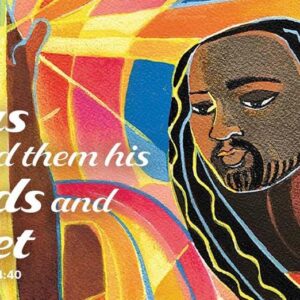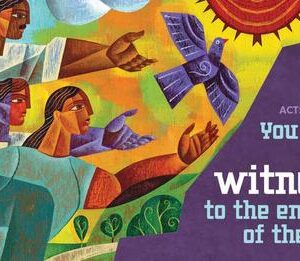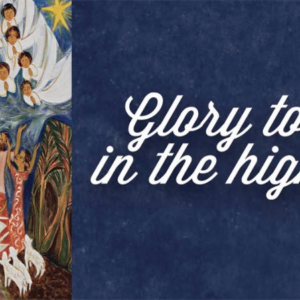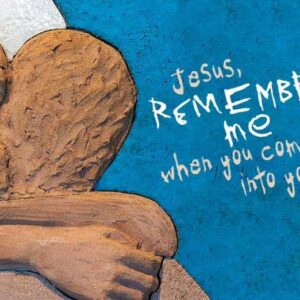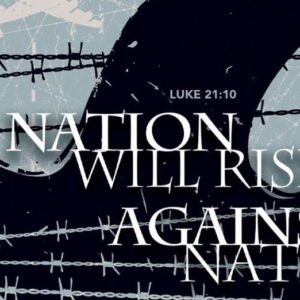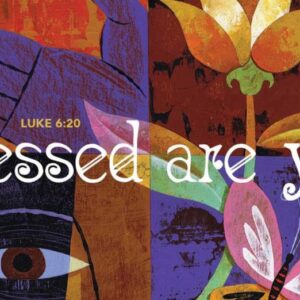Christmas Eve 2022 Festival Service
Luke 2:1-20
1 In those days a decree went out from Emperor Augustus that all the world should be registered. 2 This was the first registration and was taken while Quirinius was governor of Syria. 3 All went to their own towns to be registered. 4 Joseph also went from the town of Nazareth in Galilee to Judea, to the city of David called Bethlehem, because he was descended from the house and family of David. 5 He went to be registered with Mary, to whom he was engaged and who was expecting a child. 6 While they were there, the time came for her to deliver her child. 7 And she gave birth to her firstborn son and wrapped him in bands of cloth, and laid him in a manger, because there was no place for them in the inn.
8 In that region there were shepherds living in the fields, keeping watch over their flock by night. 9 Then an angel of the Lord stood before them, and the glory of the Lord shone around them, and they were terrified.10 But the angel said to them, “Do not be afraid; for see—I am bringing you good news of great joy for all the people: 11 to you is born this day in the city of David a Savior, who is the Messiah, the Lord. 12 This will be a sign for you: you will find a child wrapped in bands of cloth and lying in a manger.” 13 And suddenly there was with the angel a multitude of the heavenly host, praising God and saying, 14 “Glory to God in the highest heaven, and on earth peace among those whom he favors!” 15 When the angels had left them and gone into heaven, the shepherds said to one another, “Let us go now to Bethlehem and see this thing that has taken place, which the Lord has made known to us.” 16 So they went with haste and found Mary and Joseph, and the child lying in the manger. 17 When they saw this, they made known what had been told them about this child; 18 and all who heard it were amazed at what the shepherds told them. 19 But Mary treasured all these words and pondered them in her heart. 20 The shepherds returned, glorifying and praising God for all they had heard and seen, as it had been told them.
————————
Please pray with me tonight, church:
Holy God,
Through the birth of a child,
You show us what Love looks like.
Let that Love be born in us again tonight,
So that we might be Love for the world.
Amen.
————————
Merry Christmas, church!
Oh goodness… How my heart has longed to hear you say that back.
Can we do it again, just for good measure?
Merry Christmas, church!
It is a merry Christmas. It even actually feels a little bit like Christmas outside. What a joy to be gathered here, with you, rejoicing, celebrating, praying, singing…
This feels like Christmas to me.
And it’s something I don’t think I’ve really felt…fully…in 3 years or so. It’s been a long time since you’ve made me feel like I just felt. We’ve come a long way. And we still have some ways to go. But we’re on our way.
Christmas is one of the big ones for the church, right? Christmas and Easter. They’re the big wonderful worship services that we get to go all out. Special music, soaring choirs, big pomp, all the circumstance… It’s a worship that makes our heart sing.
But aside from being one of the big ones for the church, Christmas is special to me because it’s one of the few times where I actually feel worshipful, too. Christmas, in particular…it’s like my soul knows its way around this liturgy, I can just rest back in this worship service and marvel at its beauty.
Truly my heart has longed for this Christmas worship.
As soon as we hit that first note of O Come, All Ye Faithful my heart soared and my spirit relaxed. We’ve arrived. Thank you…for doing what you’ve done, for being part of this extraordinary and marvelous worship this evening.
My heart has longed for this worship, and my heart has longed to see you here tonight, church.
Welcome. And thank you.
In the season of Advent, over the 4 weeks leading up to tonight, we gathered under the theme Making Space. Making space for Advent, making space in our hearts and our homes to welcome Christ once again, as we do every year, into the world anew. We talked about making space for the possible, making space for new voices, making space for the unexpected, and finally, making space for Jesus. This Advent we’ve talked about our hopes and our expectations, our dreams, our anxieties, the longings of our hearts…and our fears.
And we talked about making space for all of that.
But once you’ve got all that, once you’ve gathered all that together…then what do you do with it?
If you tried to carry all that around, you’d stumble. No way it all fits in a backpack or a bag. No way your head can hold all onto of that, plus all the other gajillion things you’ve got on your to-do list…presents to wrap, turkeys and hams to roast, cookies to bake, potatoes to mash, family to welcome…plus, in just a couple of weeks, we’ll all be back at it again with school schedules, work schedules, sports and activity schedules, volunteer opportunities, service organizations, Boy Scouts, Girl Scouts, 4H, FFA, whatever else…plus all those brand new resolutions you just made…
How do you make space for it all?
Church, I want to invite you to do something with me tonight. Maybe something radical for you. I want to invite you to set it down. If only for a moment…just set it down and let go of it. Be here tonight. Lighten your load and let your heart soar. Set your worries, your cares, your concerns…your fears…here. Lay them in the manger.
“The hopes and fears of all the years are met in thee tonight…”
Whatever you’re carrying tonight, I invite you to set it down. Set it aside and just rest back into the wonder and beauty of this evening. Of this incredible gift of love. God’s gift of love. Given for you.
Because this familiar story is our story. It’s a story of wonder and beauty, messiness and imperfection, hopes and fears.
It’s a story about God who was born as a child into a very human family…about God loving this family so much, that God chose to be born into our human family.
It’s a story about God who came into the world through the very human and very messy act of a young woman giving birth, born among the dirt and grit of feeding troughs, animals, shepherds, sheep, angels, and everything else…about God who enters into our mess, in order to redeem our mess.
The Christmas story is a story about rough years and difficult seasons and the times we feel like giving up. It’s a story about God who chooses to enter into our human experience at its deepest…about God who would go through full expansiveness of the human condition to let you know that you are never alone in any of your circumstances.
It is into such a world as this that God chooses to be born.
God chooses to be part of it, so that you would know, beyond all doubt, that wherever you are, whatever you’re carrying, that God is there with you.
This is the wonderful good news of Christmas, church: Immanuel—that God is with you.
So what does your heart long for, church? What makes your heart soar?
As we rejoice in and celebrate God’s incredible gift of love, given to and for the world, I invite you to bring your fears and worries…and your hopes and dreams. Bring all of it. Let God hold all of it.
And know that whatever you’re holding onto, whatever your carrying, this gift of love is for you.
Your dreams…your longings…your hopes…your fears…it matters to God.
You matter to God.
You make God’s heart soar.
Merry Christmas, church.
Reign of Christ Sunday 2022
Luke 23:33-43
33 When they came to the place that is called The Skull, they crucified Jesus there with the criminals, one on his right and one on his left. 34 Then Jesus said, “Father, forgive them; for they do not know what they are doing.” And they cast lots to divide his clothing. 35 And the people stood by, watching; but the leaders scoffed at Jesus, saying, “He saved others; let him save himself if he is the Messiah of God, God’s chosen one!” 36 The soldiers also mocked Jesus, coming up and offering him sour wine, 37 and saying, “If you are the King of the Judeans, save yourself!” 38 There was also an inscription over Jesus, “This is the King of the Judeans.”
39 One of the criminals who were hanged there kept deriding Jesus and saying, “Are you not the Christ? Save yourself and us!” 40 But the other rebuked him, saying, “Do you not fear God, since you are under the same sentence of condemnation? 41 And we indeed have been condemned justly, for we are getting what we deserve for our deeds, but this man has done nothing wrong.” 42 Then the criminal said, “Jesus, remember me when you come into your kingdom.” 43 Jesus replied, “Very truly I tell you today, you will be with me in Paradise.”
————————
Please pray with me this morning, church:
Holy living, crucified, and risen Christ,
The world is yours and all that is in it.
All things are under your feet,
And around, within, and above it all, you reign.
Remind us of this simple truth, this morning.
That all things are yours.
Amen.
————————
There’s a piece to the great banana saga that Danny talked about in his sermon last week that didn’t get mentioned at the time. It is this: I, for one, am extremely grateful to the Cavendish banana. Maybe you’ve seen me around on Sunday mornings with my banana and coffee…some of our young folks like to give me a hard time about it. I’m grateful to the Cavendish banana Danny talked about because I eat bananas like they’re going out of style. Seriously…2-3 bananas a day. They’re a great post-workout breakfast, they’re handy, and they’re extremely portable.
So a world without bananas, whether Big Mikes or Cavendishes, sounds to me like…I don’t know…the opposite of paradise that Jesus talks about on the cross in our gospel reading this morning. Like, if a kind of hell is the opposite of paradise, then hell, for me, is a world in which i have to find something else to eat for breakfast. I’m just not sure I would have survived the Great Banana Blight of the early 20th century. “Take me with you, Jesus. I’m not made for a world without bananas. Take me with you to paradise where I’m certain there are plenty of tropical fruits.”
If hell is a world without bananas, then paradise, at least for me, I have to believe, is a sandy beach next to turquoise water with a fruity drink and plenty of Big Mikes and Cavendishes to go around.
I wonder what paradise might look like for you, church.
On this Reign of Christ Sunday—or Christ the King Sunday—we close the chapter on yet another liturgical year and get ready to turn to the next page and begin a new liturgical year with the First Sunday in Advent. We’ve made our way all the way around all the colors of our liturgical calendar and we’re ready to begin anew starting next Sunday. And as time marches forward, we both give thanks for the year that was and look with anticipation toward what’s coming.
Reign of Christ Sunday is a Sunday and a Festival to remember what’s truly important, what holds all of *this* together. Amidst the changing seasons and all the different liturgical feasts and celebrations, throughout it all, Christ holds all these together. Jesus is the central figure that draws us together as God’s people. And throughout all the divisive turmoil and frightening change of the world around us, God, in the person of Christ, is the one who is around it, cradling all of it in God’s arms; within it, walking with us through it every step of the way; and the one who stands above it all, guiding and pointing the way beyond all of the noise and shouting and harshness and cruelty that have become so commonplace in our lives.
Reign of Christ Sunday is an opportunity to recognize and remind ourselves, at the end of the church year, that all things are God’s. Everything we’ve just come through…is God’s. Everything to come…is God’s. All things are God’s.
Especially in the world we live in, we’re raised and conditioned to believe that all we have is our own, that we’ve made our own way, that what we have we’ve earned, and it’s our to do with what we want. Reign of Christ Sunday is a corrective lens to that worldview that says, in fact, it is all God’s. It is God’s action, God’s help, God who has done for us what we cannot do ourselves.
The prophet Jeremiah, speaking for God, reminds God’s people of all God has done. “Thus says the Lord, concerning the shepherds who shepherd my people: It is you who have scattered my flock, and have driven them away, and you have not attended to them…so I will attend to you for your evil doings. I will gather the remnant of my flock…I will bring them back to the fold, and they will be fruitful and multiply. I will raise up shepherds over them who will shepherd them, and they shall not fear any longer, or be dismayed, nor shall any be missing. I will raise up for David a righteous Branch, and this king will deal wisely and will execute justice and righteousness in the land. Judah will be saved and Israel will live in safety. And this is the name by which the king will be called: ‘The Lord is our righteousness.’”
It is God’s action. God gathers the people. God raises up the righteous Branch. God—the Lord—is our righteousness. It is God who saves, not us.
A salvation that comes through the crucifixion of Jesus. A justice, a righteousness, and a way of ruling that is completely unexpected. Not at all what we think of when we think of how a king rules. Christ rules from a cross, executed between two criminals The throne of Christ is affixed to that cross, a humiliating way to die, certainly not fit for a king. And yet Jesus is pronounced a king by those very same people who put him to death. The inscription above him reads “This is the King of the Judeans.”
Completely backwards from what we think of kings. Not a throne, but a cross. Not a crown of gold, but a crown of thorns. Not lush robes and fine linens, but a single cloth garment, mostly naked and exposed. Not a scepter, but a sponge of sour wine on a stick. Not royal decrees and pronouncements of judgment, but words of forgiveness and promises of life. “Father, forgive them… You will be with me…”
If our whole worldly system is set up as a race to the top, the dominion of God is a race to the bottom, to be found alongside those of lowest estate, those without, those with no status or wealth, the poor, the marginalized, the vulnerable, the ones the world thinks nothing of. This is your calling to discipleship, church. A path marked by justice, compassion, forgiveness, mercy, and love.
It’s a backwards way of living, but it is the way walked by Jesus, and the way of discipleship to which you are called, Christian.
And around, within, and above it all, Christ reigns.
All things are God’s.
As we’re in the thick of our Season of Stewardship, I find this reminder extremely comforting. As we look at deficits, stare down budget planning, and try and get all these things back into alignment…all the while experiencing the very same things you are at home: costs on everything soaring, being asked to do more with less, trying to stretch every last cent further… The anxiety about it all is debilitating sometimes. I know it is, church. I know it is.
But this morning I’m reminded that all things are God’s and it is God who saves, not us. We cannot save ourselves. That’s God’s work.
It doesn’t excuse us from doing what we can. There is still work for us to do and a role for us in these tough times. But I can take some deeper breaths knowing that God is in the midst of all of this, and is, in fact, working with us to figure it all out.
Last week, Danny preached about what people of God, and specifically, you people, us people, of New Hope, do when roads get tough and we’re not sure if we’ll make it all the way up this current mountain we’re climbing. I’ve been thinking about FM 1092 lately, the road just out our front door. They’ve been doing a lot of work on it this year, and they stripped it all up, and the past couple of weeks it’s been not super-pleasant to drive on. But someday soon, they’ll repave it. Someday soon, it’ll be a brand new smooth road.
When we’re climbing mountains and trying to overcome obstacles, there is no guarantee that we’ll reach our goal. And when we run out of gas, as Danny said, we get out and push. But when our legs won’t even work…when we’ve exhausted all of the energy that even we ourselves have…this is the exact moment for faith. When we get to the very end of what we ourselves are able to do, we finally must rely fully on God to get us the rest of the way. And what you’ll find, church, is that God has been there all along, helping you push, helping you get up the mountain…and that moment of faith is trusting that when we get to the absolute limits of what we are able to do ourselves, that God will get us that last little bit over the top. Trusting God to do what God promises.
Yes, there is work to do, church.
And we cannot do it without you. It will take all of us.
But we do not do this work by ourselves.
Around, within, and above it all, Christ reigns.
All things are God’s.
Thanks be to God.
All Saints Sunday 2022
Luke 6:20-31
20 Then Jesus looked up at his disciples and said:
“Blessed are you who are poor,
for yours is the kingdom of God.
21 “Blessed are you who are hungry now,
for you will be filled.
“Blessed are you who weep now,
for you will laugh.
22 “Blessed are you when people hate you, and when they exclude you, revile you, and defame you on account of the Son of humanity. 23 Rejoice in that day and leap for joy, for surely your reward is great in heaven; for that is what their ancestors did to the prophets.
24 “But woe to you who are rich,
for you have received your consolation.
25 “Woe to you who are full now,
for you will be hungry.
“Woe to you who are laughing now,
for you will mourn and weep.
26 “Woe to you when all speak well of you, for that is what their ancestors did to the false prophets.
27 “But I say to you that listen, Love your enemies, do good to those who hate you, 28 bless those who curse you, pray for those who abuse you. 29 If anyone strikes you on the cheek, offer the other also; and from anyone who takes away your coat do not withhold even your shirt. 30 Give to everyone who begs from you; and if anyone takes away your goods, do not ask for them again.
31 Do to others as you would have them do to you.”
————————
Please pray with me this morning, church:
Holy God,
We lovingly remember those who have died
Who have joined the great company of all the heavenly saints.
We recognize our calling through our baptism
To be holy and saints in our own time and our own place.
Renew and restore our hearts in your promises, God.
Sustain and nourish us in the calling and the hope
We have received from you.
Amen.
————————
By now, church, you know that my favorite sacrament is baptism, right? I mean, like, besides all the lovely important imagery and deep meaning of the act of baptism itself, I just have a lot of fun when I get to shower you with water and remind you of your baptism. It’s one of the more playful aspects of worship and I take a great amount of delight in it.
We should delight in worship, I think. We’ve got enough stodginess in our lives, amen?
But I think I’ve also told you before that baptism hasn’t always been my favorite sacrament. Growing up, communion was extremely important to me. I cherished the opportunities to have something placed in my hand and be told that this was a gift of God and it was for me. Powerful, powerful stuff. That, and it was kind of a snack break in the middle of the service, so that felt nice, too.
It was really during seminary that this shift in having a new favorite sacrament happened. As I dove more into baptism and all the things wrapped up in it and this idea of, not just of baptism as a singular event and a kind of one-and-done-type thing, but this idea of a baptismal way of living, I really started to feel like we don’t talk about baptism all that much or all that importantly in the Lutheran church.
And just as a side note, I know Reformation Sunday was last week and we kind of got all our Lutheranism out last week, but if you’re new to this whole Lutheran thing or you just are in need of a refresher, a little bit of Lutheran theology for you this morning…the Lutheran church confesses there are 2 Sacraments: Baptism and Communion. The Catholic Church confesses there are 7, but Luther was like, “Ehhhh…all that other stuff is kinda extraneous and it doesn’t quite fit with what a sacrament is, so really there are only 2.” Side note to the side note, Luther would have also lobbied pretty hard for Confession and Forgiveness to be considered a Sacrament, but he landed on 2. A Sacrament, by the way, Luther said, is an outward and tangible expression of an inward and divine reality. It’s a physical thing, something you can touch, connected with a word of promise from God, and instituted by Christ. Of all the lovely and meaningful aspects of our faith and worship, Luther said, Baptism and Communion fit those criteria.
So, of the two, I have a clear preference for baptism. And I’m not exactly apologetic about it, either.
All Saints Sunday is when we get to lean in hard to these foundational understandings of baptism.
That through our baptism, we are named “Beloved child of God” and our lives are claimed by God for God’s purposes. That through an act as small as a trickle of water running down our foreheads, God somehow reaches down into the world, the divine touches the temporal, heaven meets earth, and the lines between each get blurred, if just for a moment. We are joined to God’s family and we make promises as a family. As parents, as sponsors, and even you, church, even this family, we make promises to God, to the baptized, and to one another. Baptism is this kind of public demonstration of a reality that we believe is already present—that, in fact, we are God’s, we are beloved, we are part of and joined to the body of Christ, and that we are given to and for one another and called to live for the sake of others.
These realities are already true; baptism is a tangible expression of that.
And as members of God’s family, as God’s people given and living to and for one another, you are declared holy. You are made saints. You are declared and made that which you already are, a reality that is already present…you are holy and you are saints. You are enlightened with the Holy Spirit moving and active in your life and in the world, propelling you to be the disciples of Christ that you have been called by God in your baptism to be.
When we talk about All Saints Day, we remember, yes, all those who have gone before us, all the faithful departed, all those giants and titans whose shoulders upon which we stand…but we are are also talking about you, dear child…you, dear people…you, dear church…you are saints and you are holy. And you are called, just like all those who came before you, to do your best to live a life worthy of the calling you have received from God.
I mentioned in our announcements that we had a baptism last Sunday, in the afternoon. We have some folks who are part of our community, who are part of the life of this community—we have a number of folks who are part of our community who are being cautious about the pandemic, and they worship with us and participate as much as they can virtually, and they’re part of this community. And so we had some folks who wanted to have their newest baby girl baptized.
And so we did. And you know what, church? You were there. You were present. This community of faith, this family of saints, was present. Just like I can’t really explain how the divine and the earthly meet and intermingle in the sacraments, in a way I can’t really explain, you were present at Alexis’ baptism.
Thank you for showing up. Thank you for promising to support Shannon and John and big sister, Brooklyn. Thank you for letting them know that you take very seriously the responsibility to be a loving, affirming, nurturing place for them. Thank you.
And just as somehow you were present at Alexis’ baptism last week, just as somehow God reaches through time in baptism, God and Christ are somehow present in the meal we share together. The sacraments have a weird way of blurring these lines between the heavenly and the earthly. There’s some sort of intermixing of the two when we participate in the Sacraments. And although I give the slight edge to baptism, I still do love communion.
I heard a sermon a number of years ago talking about Communion and All Saints and have always wanted to mention it, but hadn’t really found the opportunity until now. It broke open this whole idea of communion and saints for me. If we say and confess that somehow Christ is present in the meal we share together, if it’s true that the sacraments have a way of facilitating the meeting of the divine and the earthly, then what or who else might be present at this table? We talk about the Communion of Saints and we generally mean the great multitude of all those who have gone before, but what about Communion with the saints? If Christ is somehow present in this meal, if God shows up in this sacrament week after week, isn’t it possible that there is room around this table for your loved one, too?
It’s an understanding that kind of borrows from Mexican culture and a Mexican Feast Day we know as Día de los Muertos, the Day of the Dead. That there’s a connection with our loved ones who have died that isn’t so easily broken. That’s a very comforting thought for me…that this meal, shared among friends, shared among family, shared in communion with God and Christ…is also a meal shared with loved ones who have died.
And if I somehow get to be included in such a meal with such a remarkable guest list, then maybe there’s hope for me yet to squeak out just a little bit of saintliness in this life, too.
What a hope to which to be called. What a glorious inheritance with which to be so richly blessed.
What a treasure.
As we begin our season of Stewardship this month, we’re going to be talking about hope, and treasures…and we’re calling this season A Treasured Hope. We’re asking you to think about what it is you treasure, church. What do you hope for? What are your dreams?
What are the treasures of New Hope? And how can you support the treasure that is New Hope?
You’ll be getting letters in your mailboxes in the coming days and we’ll have some Stewardship Moments in worship over the coming weeks, but those are the questions. What is your treasure? What are the treasures of New Hope? And what’s your part, what’s your role, in this treasured hope?
God bless you, saints.
You have been called according to God’s purposes.
Be refreshed for this work at this font.
Be nourished for this calling at this table.
Commune with Christ and all the saints.
Receive what you are.
Become what you are called to be.
Blessed saints.
Nineteenth Sunday After Pentecost
Luke 18:1-8
1 Then Jesus told them a parable about their need to pray always and not to lose heart. 2 Jesus said, “In a certain city there was a judge who neither feared God nor had respect for people. 3 In that city there was a widow who kept coming to the judge and saying, ‘Grant me justice against my opponent.’ 4 For a while the judge refused; but later the judge said to himself, ‘Though I have no fear of God and no respect for anyone, 5 yet because this widow keeps bothering me, I will grant her justice, so that she may not keep hitting me over the head by continually coming.’” 6 And the Lord said, “Listen to what the unjust judge says. 7 And will not God grant justice to God’s own elect who are crying out day and night? Will God delay long in helping them? 8 I tell you, God will quickly grant justice to them. And yet, when the Son of humanity comes, will the son find faith on earth?”
————————
Please pray with me this morning, church:
Holy Wisdom,
In the midst of struggle, you call us to be persistent.
Make us bold in our persistence.
Give us courage to wrestle and strive for justice.
Continue being persistent in your pursuit of us.
Help us to trust your relentless persistence in keeping your promises.
Amen.
————————
“Jesus told them this parable about their need to pray always and not lose heart.”
Well if that doesn’t just describe me down to a “t” I don’t know know what does. Maybe it gets a little close for you, too. Here’s a story about your need to pray always and not lose heart.
Well, that’s great, Jesus, because my prayer life is feeling a little lackluster these days, and honestly, I’m feeling a little disheartened, too, so bring it on. Whatcha got?
I think I love the author of Luke’s introduction to this parable precisely because it hits so close. Because who needs to be encouraged and told stories about the need to pray always and not lose heart, except those who are feeling discouraged or disheartened or like God isn’t hearing their prayers? It was true for the community to which the author of Luke was writing, and in a lot of ways it’s true for us, too.
Remain persistent…seems to come the lesson.
In case you’ve forgotten, let me tell you a little bit about persistence…particularly the persistence of young people.
You know, I really did tell myself that I did not want to be that preacher who uses their family and children as sermon illustrations, and truly, I try my best to find other descriptions that are better, but sometimes the parallels are just too closely aligned. That, and we speak to what we know, right? Right now, I know a lot of 3-year old.
Let me tell you about a 3-year old’s persistence.
For a good while now, we’ve been in the “why?” phase of life.
“Please do this.”
“Why?”
“Because I asked you to.”
“Why?”
“Because I would like it done.”
“Why?”
“So we can do this other thing.”
“Why…?”
“Why does this happen? Why does it do this? Why did they eat that? Why did this person say that?”
You get the idea.
Relentless persistence.
The widow in Jesus’ parable this morning is relentlessly persistent in her pursuit of justice. We’re not told if her cause is just. We’re not told if what she’s asking for is fair or not. We are told that the judge is unjust, that the judge neither feared nor had respect for God and didn’t respect people. Somewhat humorously, the judge even says this about himself, “Though I have no fear of God and no respect for anyone…” I think we are left to assume that the widow’s cause against her opponent is just, at least, when seen in contrast to the unjust-ness of the judge. That, coupled with what we know about widows in 1st century Palestine in the Roman Empire…widows had no standing in society. Along with orphans and folks with disabilities and ailments, widows occupied one of these lowest stratifications in the hierarchy of the Empire.
The widow is relentlessly persistent in her pursuit of justice.
Are we as relentlessly persistent in our prayers?
Are our prayers petitions to God to grant justice?
Are your prayers, church, prayers that God would bring about justice?
Or are your prayers more reflective of your own concerns, your own needs, your own problems and issues? Not saying those aren’t important, just that we ought not forget that the widow’s persistence was in pursuit of justice. Certainly makes you think about the content of your own prayers.
Last week we talked a little bit about prayer, and how very often prayers and words of thanksgiving aren’t quite as near to our lips as those prayers we pray asking God for what we want or need. Be persistent, I think Jesus would say. Whether in thanksgiving or supplication, be relentlessly persistent in prayer. And pray for justice. More than a focus on your self and the things that are going on in your small circle and are consuming you and your thoughts, pray that God’s will would be done. Pray that that long moral arc that the Reverend Doctor Martin Luther King, Jr. talked about would continue to and finally bend toward justice.
Be persistent. Pray through the night if you have to. Wrestle, struggle with this pursuit of justice.
God’s blessing does come, and very often we’ve got the wounds and scars to show for it. Wrestling and striving with God is a holy thing, it’s biblical, even, church. And that wrestling can leave us feeling like our hip has been put out of place.
That struggle for justice may last through the night, but God’s blessing arrives with the dawn.
Talking about prayer gives me the opportunity to remind you one of my favorite understandings of prayer: we don’t pray to change God’s mind. Prayer doesn’t bend God’s will toward our own. Prayer changes us, and opens us up to having our will changed to be reflective of God’s. Our prayer is not that God’s will would match ours, rather that God would grant us the understanding to shape our will to match God’s.
Be relentlessly persistent in prayer.
Most pastors and deacons and church leaders I know are finding themselves spending a lot more time in prayer these days. Things are hard and very often when we’ve exhausted all the ways we can think of to try and do it ourselves, we finally reach out to God in hopes of a little bit of divine advice. I know I’ve certainly been praying a lot these days…that God would open a way, make it clear to me what I should do, what we should do…
What if I was relentlessly persistent in my prayers all the time? What if I didn’t try to do it all myself before reaching out to God? How might that persistence change me or help me see that different way more clearly?
I know Pastor Julio prays a lot all the time. For the health and safety of all the people in his communities. For an end to violence and corruption. For good weather and favorable crops so that the farmers would be able to sell what they’ve grown and so that they would have enough to live.
It’s a hard thing to be so worried about your community all the time.
The good news, church, is that whether or not we are relentlessly persistent in prayer or relentlessly persistent in seeking justice, God is relentlessly persistent in pursuing after us. God is persistent in God’s pursuit of justice and in pursuing us to join God in that work.
The good news is that God doesn’t stop, doesn’t grow weary, and doesn’t lose interest in that pursuit.
God promises justice.
God pursues justice, and inspires us to join God in that pursuit.
Even in the midst of struggle, God’s blessing does come.
God promises life, and life abundant.
God is relentlessly persistent in keeping God’s promises.



